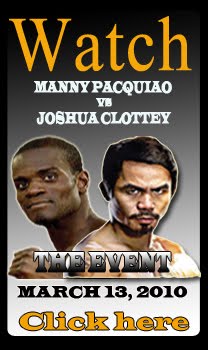On Saturday night in CowboysStadium, Pacquiao defeated Joshua Clottey by unanimous decision to retain his World Boxing Organization welterweight championship. He pummeled Clottey’s ribs and midsection. He turned Clottey into a punching bag of bruised and battered muscles.
Afterward, the spotlight swung back toward Mayweather. Pacquiao’s trainer, Freddie Roach, implored Mayweather to drop his demands for blood testing. He said Pacquiao had mimicked Mayweather’s fighting style during sparring, making fun of perhaps his most difficult opponent.
Roach said of that style, “We will crush it.”
The fight that boxing fans demand looms, larger than ever. Because Pacquiao continues to dismiss all challengers, except Mayweather. On Saturday, Pacquiao essentially won his semifinal, leaving Mayweather, who fights Shane Mosley on May 1 in Las Vegas, to win his bout before negotiations between boxing’s two best fighters can resume.
“We’re ready to fight him any time,” Pacquiao said of Mayweather, before landing his hardest punch of the night, adding, “I don’t think he’s ready to fight.”
In this bout, Clottey boxed defensively, conservatively, as if unable to summon an attack. He threw 399 punches to Pacquiao’s 1,231. In the seventh round, Clottey managed to bruise Pacquiao under his right eye, but Pacquiao remained on the offensive, stalking Clottey, landing body shot after body shot.
The question lingered. When would Clottey let his hands go and unleash his superior strength and size? When would he, you know, fight?
Clottey opened up occasionally in the later rounds, but by then it was too late. By then, Pacquiao had dispatched another challenger. By then, cries for Mayweather-Pacquiao had already begun to echo across the stadium.
“He has great speed,” Clottey said of Pacquiao. “It was difficult for me to handle that.”
The fight had a surreal premise: an African and a Filipino fighting in Texas, the birthplace of Top Rank Boxing and, fittingly, the Cowboys’ owner, Jerry Jones.
The fighters entered the ring to deafening noise and an electric atmosphere. Clottey danced. Pacquiao stalked into his corner, bowed, prayed, then climbed the ropes, smiling at the masses. Nervous? No. He had spent the previous two hours watching N.B.A.basketball on television.
This being football country, the crowd swelled with N.F.L. players, ex-players, coaches, ex-coaches, even owners. It included Jimmy Johnson, the retired coach, and Woody Johnson, the Jets’ owner, along with a bevy of former Cowboys: Deion Sanders, Roger Staubach, Troy Aikman, Barry Switzer.
Early on, it was Clottey, the bigger, stronger fighter, who landed the bigger shots. But it was Pacquiao, the skilled technician, who appeared to win most, if not all, of the early rounds, as Clottey treated each punch as precious, thrown only on special occasions.
Clottey managed to slow the pace through the middle rounds, but Pacquiao continued to attack, landing combinations. He controlled the fight early, controlled it late, the outcome all but certain.
Afterward, Pacquiao said: “It was not an easy fight. It was hard. I felt his power.”
Just before noon Saturday, Pacquiao and staff members assembled for Mass at the exhibition center adjacent to their hotel. They sang hymns and said prayers and received communion, while fans snapped pictures with their cell phones. Pacquiao worshipped God, while hundreds worshipped him, a peaceful moment to conclude a kumbaya-style camp.
The last two months, from training through fight week, unfolded in atypical serenity for Team Pacquiao. The fighter flew some 130 members of his entourage here on a private jet, then spent most nights inside his suite, playing poker and belting out his favorite karaoke tunes.
Even Michael Koncz and Alex Ariza, the Pacquiao employees who engaged in a fistfight last training camp, teamed up so Koncz could win a staff weight-loss challenge worth $3,000.
“I’m starting to worry,” Roach said, half joking. “I’m going to start something, because this camp has gone too smoothly.”
Normally, Pacquiao thrives amid dysfunction. This time, the opposite worked, too.
As the circus around him swelled, Pacquiao won 12 straight fights, including this one, won seven titles in a record seven weight divisions and won the award for fighter of the decade. Roach earned his fourth trainer of the year award this year, another mark for the punishing pair.
Pacquiao appeared more entranced by Cowboys Stadium than by his opponent this week. Walking in for his first news conference, wearing a white jersey, Pacquiao said he felt like a football player, like the receiver Michael Irvin.
This gleaming, palatial stadium with a scoreboard the size of a small town helped replace interest lost when Pacquiao’s negotiations with Mayweather fell apart over blood testing.
Boxing wanted to expand its fan base. Jerry Jones wanted to show off his latest toy, its price tag in excess of $1 billion. The fight featured three stars: Pacquiao, Jones and the one at midfield, underneath the ring.
Even with Clottey, a competent if relatively unknown welterweight, opposing Pacquiao, the bout sold more than 50,000 tickets, some standing-room only. When Clottey’s manager called his fighter with Pacquiao’s proposal, Clottey first asked if he was kidding. Like everyone else, Clottey expected Mayweather and Pacquiao to fight.
Maybe they still will, but dozens of factors demand answers, difficult ones at that. Mayweather has not backed off his blood-test demands. He must beat Mosley in early May. Pacquiao will soon run for a congressional seat in the Philippines, and to fight Mayweather, he would presumably need to drop his defamation lawsuit.
On Saturday, as the Mayweather questions swirled amid the celebration, Pacquiao said he would decide on his next fight after the election. In reality, only one opponent remains — for boxing fans, for Pacquiao, for Mayweather, for the sport itself.
Pacquiao proved that on Saturday, after another convincing win against an overmatched welterweight opponent.
Author: GREG BISHOP
Source: nytimes.com
















